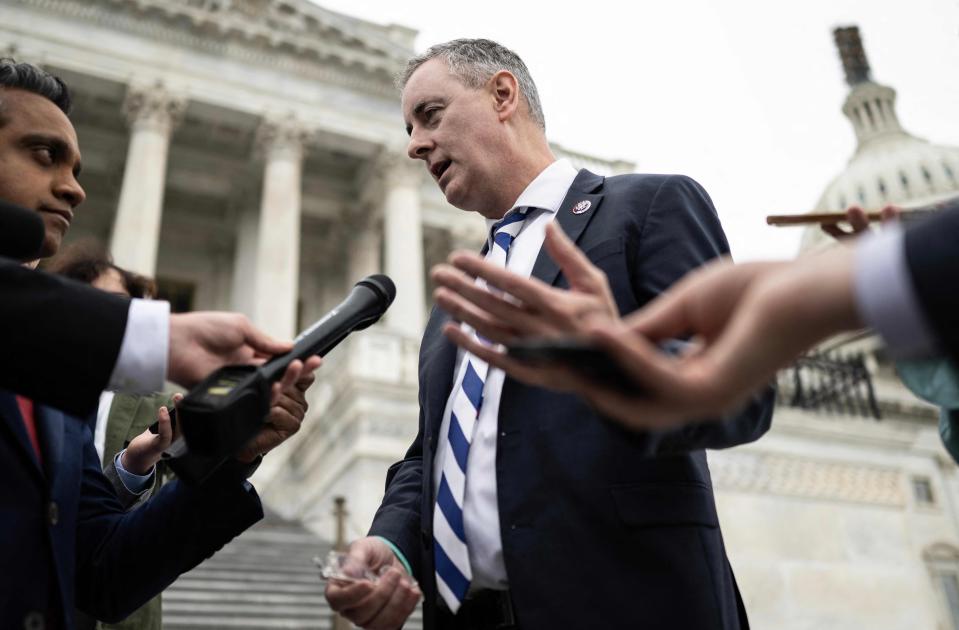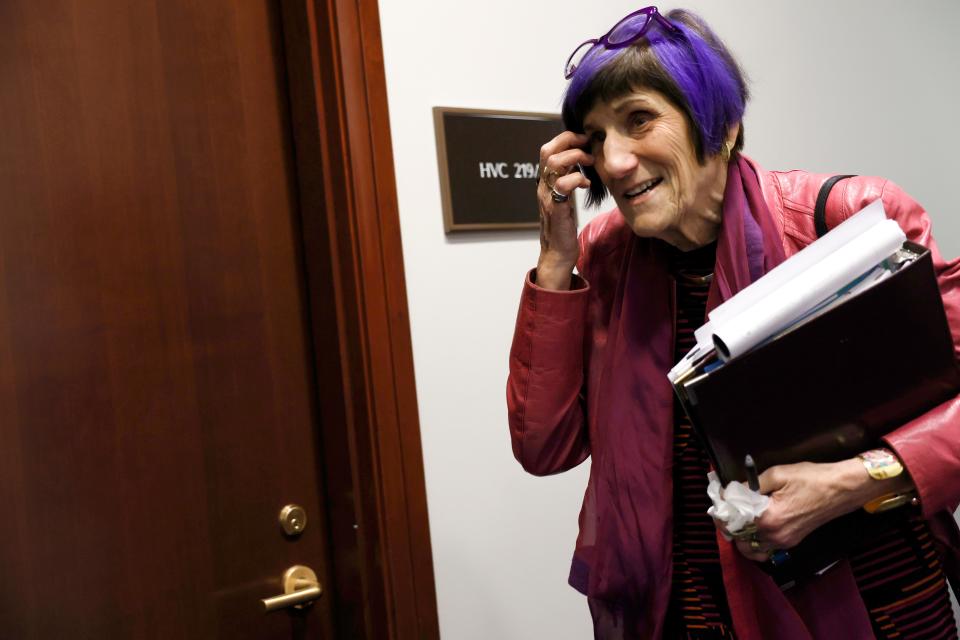Speaker Johnson is defying his right wing on budget deal. But can he avoid a shutdown?
- Oops!Something went wrong.Please try again later.
WASHINGTON — With a week until a partial government shutdown, House Speaker Mike Johnson is defying the right wing of his party – at the potential risk of his job – to stay the course on a spending deal set with Democrats.
"Our topline agreement remains," Johnson told reporters Friday, after a tumultuous 24 hours that threw the stability of the deal into question. "We are getting our next steps together and we are working toward a robust appropriations process."
However, the path to avoid a shutdown is still unclear as Johnson has not yet agreed to extend Congress' deadline, despite the near impossibility of meeting it.
Congress has two staggered government funding deadlines ahead on Jan. 19 and Feb. 2. On Sunday, Johnson and Senate Majority Leader Chuck Schumer agreed on an overall spending level for the appropriations bills, but little else has been done. Multiple members of both House and Senate appropriations committees have said they cannot meet the Jan. 19 deadline given the timeframe.

Intraparty squabbles plague House Republicans
That time crunch has been complicated this week by intraparty fighting between Johnson and ultraconservative House Republicans, who were enraged by the deal which they say does not do enough to cut spending.
A group of those members lashed out at Johnson by shutting down floor activity on Wednesday and saying they're considering a motion to vacate – the first step in kicking out the speaker.
The agreement was further thrown into question on Thursday, when right-wing members emerged from a meeting with Johnson suggesting that he was reconsidering it. On Friday, Johnson said that is not the case.
Johnson’s announcement that leadership is sticking by the top line is certain to further heighten already strenuous tensions between him and the House Freedom Caucus, which appeared to be satisfied that Johnson was considering reneging on the agreement.
“I think it’s a bad move, I think it’s a bad top line deal,” said Rep. Byron Donalds, R-Fla., a member of the Freedom Caucus.
After Johnson met with his right flank, he met with swing-district Republicans in his office Friday morning, who urged him to abide by the topline agreement. Otherwise, they said, withdrawing from the deal would put the country on an almost surefire path towards a government shutdown.
“We all share a level of frustration that we want to continue to govern, we want to continue to rein in federal spending,” Rep. Marc Molinaro, R-N.Y., a vulnerable Republican, said. Despite his wish for more cuts, “we support the speaker’s negotiated framework.”

“Look, at the end of the day, the (Fiscal Responsibility Act) was passed. Those were the numbers that we have to work with,” said Rep. Mike Lawler, R-N.Y., another swing-district Republican.
Others of those moderate members expressed frustration with the right wing of their party’s insurgence.
“Once you get a deal, you have to stick with it,” said Rep. Don Bacon, R-Neb. “We’ve got 10 or 12 loudmouths who are trying to take over the whole conference.”
Rep. Dave Joyce, R-Ohio, chair of the moderate Republican Governance Group, said the House has gone “backwards” on progress to funding the government, considering lawmakers spent the whole week uncertain whether the spending agreement would remain.
A short- or long-term extension to fund the government?
Even if he succeeds in calming the multiple factions of his caucus, Johnson faces another challenge.
Both parties in the Senate and Democrats in the House support another short-term extension – referred to as a continuing resolution – to allow lawmakers more time to put together spending bills and avoid a shutdown.
But Johnson pledged not to pass a third short-term extension in November, after his support of a second extension landed him in hot water with Freedom Caucus members.
Former House Speaker Kevin McCarthy was ousted from his job when he supported the first extension and struck the original spending agreement with President Joe Biden. That agreement mirrors the spending numbers that Johnson is currently grappling with.
Conservatives are pushing Johnson to embrace a full-year continuing resolution, which would fund the government until the next fiscal year, which begins Oct. 1. However, that would trigger deep spending cuts, including defense spending, which alarms Democrats and some moderate Republicans.
“There’s problems with defense spending,” said Rep. Brian Fitzpatrick, R-Pa. “We can’t be cutting the military.”

After Johnson’s announcement that the bipartisan agreement continues to be the House’s plan to averting a shutdown, House Freedom Caucus Chairman Bob Good, R-Va., told reporters he will continue to discuss it with Johnson and pushed for a full-year extension.
There is one more added wrinkle: Some House Republican lawmakers are discussing attaching government funding to the passage of a House-passed border security package that stands no chance of success in the Democrat-controlled Senate and White House.
That differs from the approach in the Senate, where lawmakers are negotiating a bipartisan border deal attached to supplemental funding for Ukraine and Israel.
“The border must be secure. Period,” Donalds said Friday. “If the government won’t secure its border – or frankly, if the Senate won’t secure the border – the way it deserves to be for the American people, then this government doesn’t deserve money.”
Congress still has many steps ahead to avert shutdown
With just one week left, it’s almost certain a continuing resolution is needed to avert a partial shutdown. While Congress has agreed on the topline spending number – for now at least – the committees passing individual appropriation bills have yet to decide their own spending numbers, a key step in funding the government.
“Look, if it took this long to get one line, which was the topline, how long do you think it will take to get every single line in 12 different bills?” Rep. Tom Cole, R-Okla., said Friday. “Appropriators can move pretty rapidly, but you need time to write it.”
When Republicans took charge of the House last year, they pledged to change the way appropriations were done in Washington.
Rather than pass a massive omnibus bill close to the Christmas holiday, they wanted to pass each of the 12 appropriations bills on their own, giving members time to deliberate on their contents.
While that’s looking more and more unlikely, it’s not unusual. The United States government has had four shutdowns in the past decade, and Congress has only passed all of its required spending bills on time four times in the last five decades.
“How do you fix it?” said Rep. Rosa DeLauro, D-Conn., the ranking member of the House Appropriations panel. “You get a new set of folks that are dealing with appropriations.”

This article originally appeared on USA TODAY: Johnson is defying conservatives on budget. Can he avoid a shutdown?

